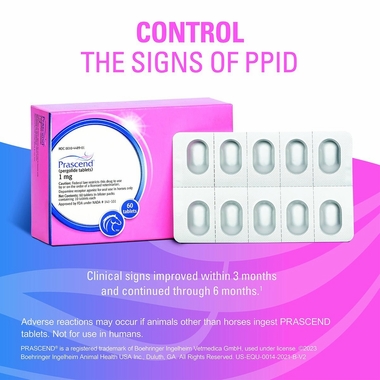SAVE 15% OFF 15% OFF Use Code EPX15 *
Prascend for Horses - Pergolide - 1-mg (60 tablets) - [Cushing's Disease]
- Notice
- Description
- Ingredients
- Directions
- FAQ
- Reviews
Notices
PRASCEND ON SALE! Discounted price can be seen in cart.
Description
Prascend Tablets for Horses: Management of Equine Cushing's Disease (PPID)
Prascend tablets are a vital veterinary medication specifically formulated for the effective management of clinical signs associated with Equine Cushing's Disease, also known as pituitary pars intermedia dysfunction (PPID), in horses. Each tablet contains the active ingredient pergolide mesylate, which plays a crucial role in regulating the excessive production of certain hormones linked to PPID. This medication is essential for achieving hormonal balance and providing significant relief from common PPID symptoms such as increased thirst and urination, unexplained weight loss, and abnormal coat growth (hirsutism). Prascend tablets are designed for convenient oral administration, making daily treatment easier for horse owners. Please note that Prascend is a prescription-only medication and must be used under the direct supervision of a licensed veterinarian.
Key Features of Prascend for Horses:
- Pergolide Mesylate: The primary active ingredient, a potent dopamine receptor agonist, effectively manages the hormonal imbalances underlying Equine Cushing's Disease.
- Hormonal Regulation: Directly helps to regulate the overproduction of hormones, such as ACTH, associated with PPID.
- Comprehensive Symptom Management: Addresses and alleviates key clinical signs of PPID, including polydipsia (increased thirst), polyuria (increased urination), weight loss, and hirsutism (abnormal coat growth).
- Easy Oral Administration: The tablet form is designed for convenient daily oral dosing, improving compliance and reducing stress for both horse and owner.
- Prescription-Only Medication: Ensures safe and appropriate use under the guidance of a veterinarian who can monitor your horse's response and adjust treatment as needed.
How Prascend (Pergolide Mesylate) Works:
Prascend's active ingredient, pergolide mesylate, is a potent dopamine receptor agonist. In horses with Equine Cushing's Disease, it is believed that the loss of dopaminergic inhibition leads to the overproduction of hormones by the pituitary gland. Pergolide works by stimulating dopamine receptors in the pituitary gland, which helps to inhibit the excessive release of hormones like prolactin and ACTH, thereby managing the symptoms of PPID.
Indications:
Prascend is specifically indicated for the control of clinical signs associated with Pituitary Pars Intermedia Dysfunction (equine Cushing’s Disease) in horses.
Specifications:
- Active Ingredient: Pergolide mesylate
- Brand Name: Prascend
- Type: Oral tablet
- Available Strength: 1 mg tablets
- Indicated for: Management of clinical signs associated with pituitary pars intermedia dysfunction (Cushing's disease) in horses
- Dosage Form: Tablet
- Administration: Administer orally once daily, preferably in the morning, with or without food
- Storage: Store at controlled room temperature (20-25°C, 68-77°F), brief temperature excursions permitted between 15-30°C (59-86°F)
- Manufacturer: Boehringer Ingelheim Pharmaceuticals, Inc.
- Prescription Required: Yes, prescription-only medication. Must be prescribed by a veterinarian.
Ingredients
Active Ingredient:
Peroglide
Directions
View Prascend Drug Facts Sheet.
Administer orally at a starting dose of 2 mcg/kg once daily. Dosage may be adjusted to effect, not to exceed 4 mcg/kg daily. It has been reported that pergolide tablets may cause eye irritation, an irritating smell, or headache when PRASCEND Tablets are split or crushed. PRASCEND Tablets should not be crushed due to the potential for increased human exposure and care should be taken to minimize exposure when splitting tablets. The tablets are scored and the calculated dosage should be provided to the nearest one-half tablet increment (see Table 1).
| Body Weight | 2 mcg/kg Dosage | 4 mcg/kg Dosage |
|---|---|---|
| 136 - 340 kg (300 - 749 lb) | 0.5 tablet | 1 tablet |
| 341 - 568 kg (750 - 1,249 lb) | 1 tablet | 2 tablets |
| 569 - 795 kg (1,250 - 1,749 lb) | 1.5 tablets | 3 tablets |
| 796 - 1,022 kg (1,750 - 1,249 lb) | 2 tablets | 4 tablets |
Dosing should be titrated according to individual response to therapy to achieve the lowest effective dose. Dose titration is based on improvement in clinical signs associated with Pituitary Pars Intermedia Dysfunction (PPID) and/or improvement or normalization of endocrine tests (for example, dexamethasone suppression test or endogenous ACTH test). If signs of dose intolerance develop, the dose should be decreased by half for 3 to 5 days and then titrated back up in 2 mcg/kg increments every 2 weeks until the desired effect is achieved.
Caution:
Federal law restricts this drug to use by or on the order of a licensed veterinarian.
Contraindications:
PRASCEND is contraindicated in horses with hypersensitivity to pergolide mesylate or other ergot derivatives.
Warnings:
Do not use in horses intended for human consumption.
Human Warnings:
Not for use in humans. Keep this and all medications out of the reach of children. PRASCEND should not be administered by persons who have had adverse reactions to ergotamine or other ergot derivatives. Pregnant or lactating women should wear gloves when administering this product. It has been reported that pergolide tablets may cause eye irritation, an irritating smell, or headache when PRASCEND Tablets are split or crushed. PRASCEND Tablets should not be crushed due to the potential for increased human exposure and care should be taken to minimize exposure when splitting tablets. Consult a physician in case of accidental ingestion by humans.
Precautions:
Treatment with PRASCEND may cause inappetance.
The use of PRASCEND in breeding, pregnant, or lactating horses has not been evaluated. The effects of pergolide mesylate on breeding, pregnant, or lactating horses are not known; however, the pharmacologic action of pergolide mesylate suggests that it may interfere with reproductive functions such as lactation.
PRASCEND is approximately 90% associated with plasma proteins. Use caution if administering PRASCEND with other drugs that affect protein binding. Dopamine antagonists, such as neuroleptics (phenothiazines, domperidone) or metoclopramide, ordinarily should not be administered concurrently with PRASCEND (a dopamine agonist) since these agents may diminish the effectiveness of PRASCEND.
Animal Safety:
In a six month target animal safety study healthy adult horses received PRASCEND administered orally, once daily, at doses of either 0 mcg/kg, 4 mcg/kg, 6 mcg/kg, or 8 mcg/kg (0X, 1X, 1.5X, or 2X the maximum recommended dose). There were eight healthy horses (four males and four females) in each treatment group. Doses were prepared by dissolving tablets in approximately 10 mL of a 50% sugar water solution.
PRASCEND treated groups had lower mean heart rates and higher mean temperatures than the control group. Horses in all treatment groups had minimum heart rates within the normal range and maximum temperatures below 101.5°F. One 1.5X horse experienced a mild episode of spasmodic colic on Day 3 that resolved after treatment with flunixin meglumine.
Mean red blood cell counts and hemoglobin values were lower in PRASCEND treated groups as compared to the control group. Other hematology parameters including hematocrit, white blood cells, absolute neutrophils, and absolute lymphocytes exhibited mild, transient decreases as compared to the control group. The hematology parameters generally decreased over the first 30 to 60 days after treatment initiation and then returned to values similar to pre-treatment levels. No treatment related alterations were identified on histopathology evaluation of bone marrow.
Storage:
Store at or below 25°C (77°F).
FAQ
Reviews
- Small enough, you can drop it in their grain and they'll eat it.
- Sometimes my pony will not eat it. I wish it was in liquid form so that I could give it to her in her mouth.
- Works! Entirelypets makes it more affordable w/ their discounts & coupons
- EXPENSIVE & more drug needed if blood work indicates .
- Easy to administer .
- Expensive medication since it needs to be given for the rest of the horses?s life.
- excellent product for horses
- over priced
- Will definitely look to order from them again.
- No problems or issues.
- A LITTLE DIFFICULT TO PORTION PILLS INTO SMALLER DOSES
- Easy to administer.
- Cost Savings!
- Did not receive any type of shipping notice to know when it would arrive
- Great price, nice people
- none
- Price
- Shipping
- Coupons
- Fast


























